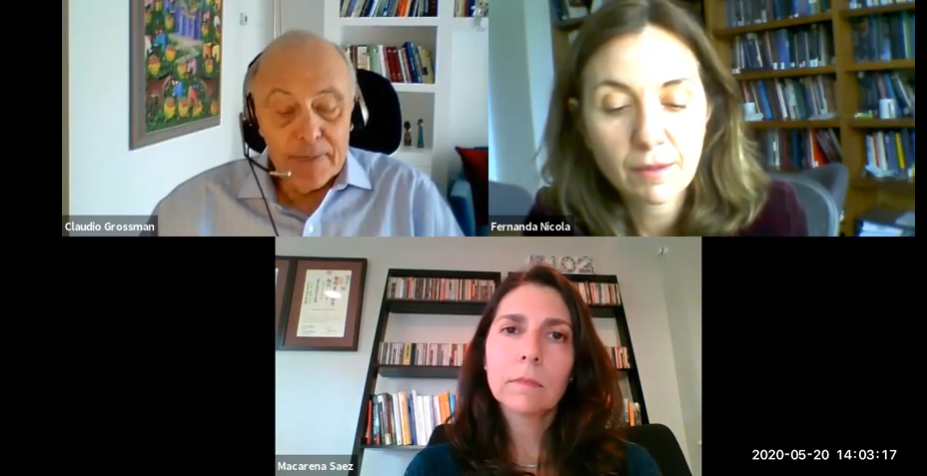States of Emergency in International Law and the Current Pandemic

On May 20, 2020, AUWCL launched its new faculty webinar series—“WCL Faculty Speaks” – to address key legal and policy issues impacted by the COVID-19 crisis. The first webinar in the series was “States of Emergency in International Law and the Current Pandemic.” This webinar featured four AUWCL professors: Claudio Grossman, Fernanda Nicola, Macarena Saez, and Robert Goldman. The webinar covered several topics relating to the COVID-19 pandemic, including the relevance of international law in unprecedented situations, the disproportionate impact of emergency responses on vulnerable populations, country-by-country responses in the handling of emergency measures, and international humanitarian law and its relationship to the coronavirus pandemic.
Is international law relevant in unprecedented situations such as COVID-19?
When the coronavirus pandemic response began, democratic institutions around the globe inquired as to whether governments have the authority to force its citizens to stay inside their homes, wear face coverings, or whether laws and treaties already in place can restrict movement across the globe. Though a pandemic response to the proportion of COVID-19 is unprecendented, prior emergency situations govern that states are entitled to suspend the rights without the need to declare an emergency situation when it is necessary and in accordance with the law, in the interest of national security, public safety, or the economic wellbeing of the country. When these limited suspensions are not enough to deal with the emergency, the requirements for declaring a state of emergency include absolute necessity, time restrictions, and proportionality to the emergency.
Governments Must Factor Vulnerable Populations in Emergency Response Measures
As the global response to COVID-19 enters the six month mark, the disproportionate impact that the COVID-19 pandemic has had on vulnerable populations is more and more desperate. These vulnerable populations include those in poverty, minority populations, women, and gender non-conforming individuals. When determining the scope of emergency responses, some argue that restrictive measures, especially stay at home orders, are widely implemented throughout the population, so everyone is equally "suffering". However, this does not take into consideration those who started the crisis lacking certain basic services; running water, proper sanitation, or adequate food sources. In considering restrictive measures to mitigate an emergency situation, governments must be willing to help and take into consideration the vulnerable populations that are much more negatively affected during emergency situations.
Emergency Response Comparison: Italy and Hungary
Both Italy and Hungary were badly impacted by the coronavirus, and both had existing weaknesses pre-pandemic: Italy ushered in a new government in 2018 that favors populism, and was hesitant to address the economic problems affecting the country before the pandemic. In Hungary, the government of Victor Oban, which came to power in 2012, had effectively turned into a rogue state by suspending Article 2 of the Treaty of the European Union.
In handling the coronavirus response, Italy immediately declared a state of emergency, and put in restrictions that were both timely and within the scope of the situation, and used their military to help communities, such as building hospitals in needed areas. On the other hand, in Hungary, the Oban Regime implemented a “warlike” rhetoric, calling in the military to ensure total control over the population, and effectively dissolving the judiciary and parliamentary oversight in order to respond to the pandemic. While both governments are part of the European Union, the EU generally does not interfere with domestic issues. Its goal is to make sure that measures taken are fair and proportionate to the situation. However, the EU ultimately had to express its concerns about the situation in Hungary.
Does International Humanitarian Law Apply to COVID-19?
International humanitarian law or IHL, also known as the laws of armed conflict, only applies to the conduct of warfare and seeks to protect civilians. IHL only applies in situations of armed conflict that fall within the Geneva Convention definition of warfare: armed conflict between two or more state powers, or hostilities between states or non-state actors. When these conditions do not exist, IHL does not apply. With this definition, states cannot be at war with a virus, poverty, terror, drugs, et cetera. By contrast, human rights law can be applied in situations of an emergency such as a pandemic. For example, during the war in Iraq, the U.S. military would be responsible under human rights law to take measures to help the civilian population during a pandemic.